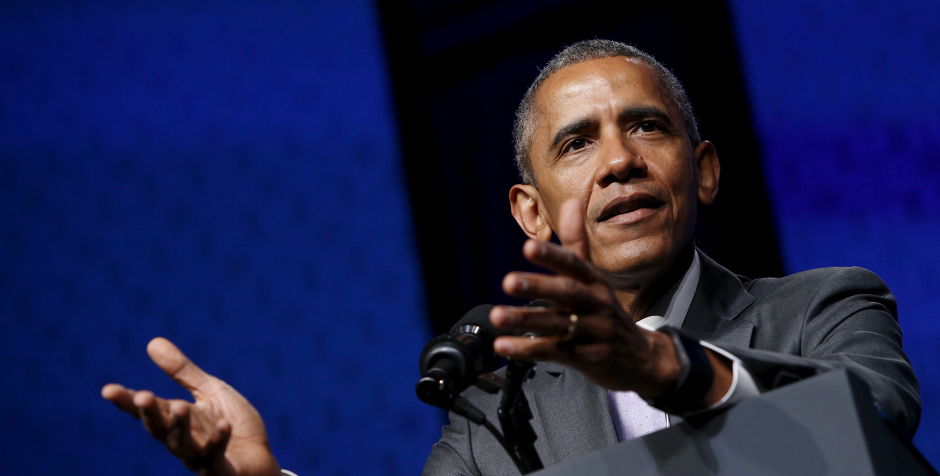Dangerous Obama Administration Arguments Repeatedly Rejected by the Supreme Court
Over the years, Presidents have, at times, pushed the boundaries of their authority, often giving rise to litigation reaching the Supreme Court. For example, in Youngstown Sheet & Tube Co. v. Sawyer, the Court held that President Truman exceeded his authority by ordering the seizure of privately-owned steel mills in order to avert a strike of steel workers during the Korean War.
The Obama Administration has taken some extreme positions that would expand presidential power at the expense of Congress, the states, and the exercise of fundamental rights. Fortunately, the Supreme Court has unanimously rejected these positions time and time again, as recently as this month.
As my colleague Geoff Surtees recently explained, in Reed v. Town of Gilbert, the Supreme Court unanimously held that a town code’s discriminatory sign restrictions violated a church’s freedom of speech. The Court rejected arguments made by the Obama Administration that, if accepted, would have given the government a much freer hand to subject individuals and groups to impositions upon their ability to speak effectively. The ACLJ filed an amicus (“friend of the Court”) brief with the Court arguing against the Administration’s position.
Just last year, the Court rejected similar arguments that the Administration made in support of a law restricting pro-life speech. In McCullen v. Coakley, the Court unanimously invalidated a law that allowed the establishment of large buffer zones encompassing public sidewalks near abortion clinic entrances. The ACLJ filed an amicus brief in support of the pro-life sidewalk counselors who prevailed in the case.
In another First Amendment case, the Court unanimously rejected the Administration’s view that the “ministerial exception,” which allows churches and religious schools to select their ministerial employees without governmental interference, should only apply to employees engaged in exclusively religious functions. As explained in an amicus brief filed by the ACLJ and InterVarsity Christian Fellowship/USA, this argument would have put the federal government in the business of micromanaging ministerial-related hiring and firing decisions of religious organizations.
In two other cases, the Court unanimously rejected Obama Administration positions that would have limited Fourth Amendment rights when it held that the police usually need a warrant to search digital information on a phone taken from an individual who has been arrested, and that attaching a GPS device to a vehicle in order to track its movements is a search usually requiring a warrant.
The President has also attempted to circumvent Congress. For instance, when the President bypassed Senate approval for NLRB candidates by appointing them while the Senate was in pro forma session, the Court unanimously held that the President exceeded his authority. We filed an amicus brief representing Speaker of the United States House of Representatives John Boehner in which we discussed the invalidity of the President’s actions.
Additionally, this Administration has overstepped its authority at the expense of state autonomy. For example, in Arizona v. United States, the Court unanimously rejected the Administration’s position that informal “enforcement priorities” that were not supported by any federal statute preempted a particular provision of a state law relating to immigration. The ACLJ filed an amicus brief on behalf of Members of Congress and thousands of Americans opposing the Administration’s arguments.
There are various other instances in which Obama Administration positions were rejected by a majority of the Supreme Court, most notably the Hobby Lobby decision in which the Administration argued against the application of a federal law protecting religious freedom. The ACLJ filed an amicus brief in that case on behalf of Christian business owners whose religious beliefs would not allow them to comply with the HHS Mandate.
Fortunately for all Americans, in light of their experiences with the British crown, the drafters of the United States Constitution were keenly aware that “[t]he accumulation of all powers, legislative, executive, and judiciary, in the same hands . . . may justly be pronounced the very definition of tyranny.” As such, they designed our system of government with these principles in mind:
“[T]he great security against a gradual concentration of the several powers in the same department, consists in giving to those who administer each department the necessary constitutional means and personal motives to resist encroachments of the others. . . . Ambition must be made to counteract ambition. . . . [W]hat is government itself, but the greatest of all reflections on human nature? If men were angels, no government would be necessary. . . .”
The fact that overbroad presidential ambition can be counteracted through peaceful means, such as litigation and Congress’s exercise of its own authority, while countless executives throughout history have either reigned with absolute power or were limited only by the use or threat of military force, is one of the many blessings of our constitutional system of government.
At the ACLJ, we will continue to aggressively – and successfully – defend the Constitution against Executive overreach.
